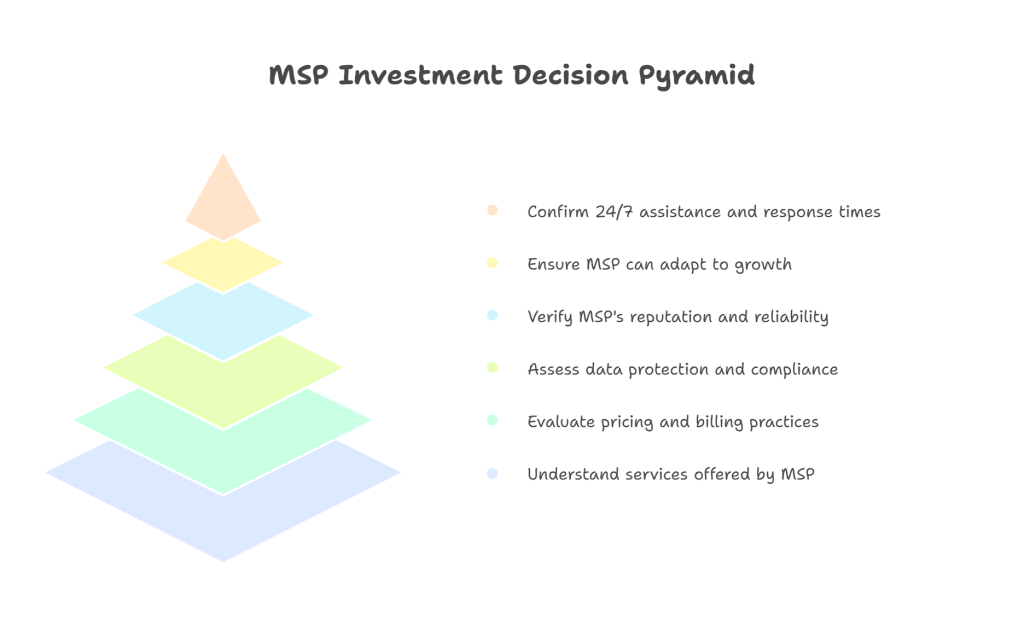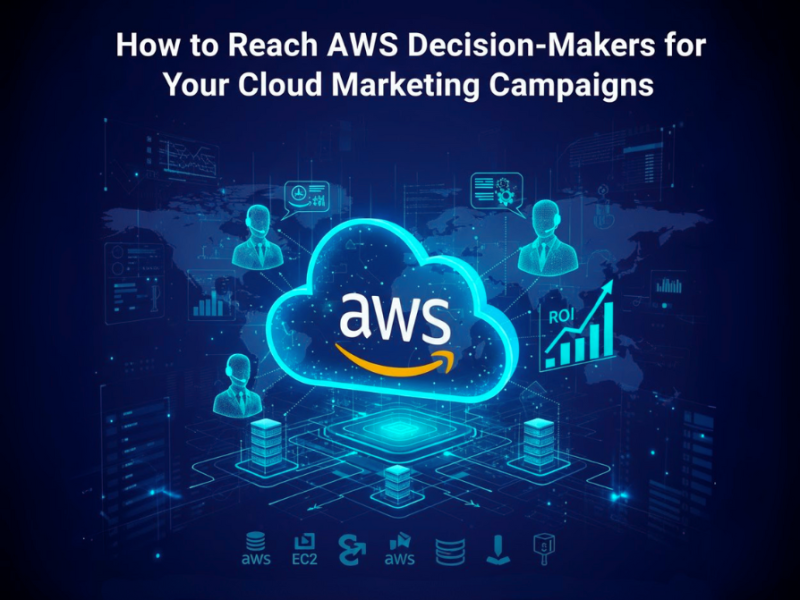The frantic call from your head of sales is one you know all too well. The server is down, the team can’t access the CRM, and a crucial deadline is looming. Productivity has ground to a halt, frustration is mounting, and you’re left scrambling for a solution, wondering if your current IT setup is a business asset or a liability.
For many small to medium-sized enterprises (SMEs), this scenario is a recurring nightmare, highlighting the critical need for robust, reliable IT infrastructure.
Partnering with a Managed Service Provider (MSP) can be a transformative investment, offering access to expert IT support, enhanced security, and predictable costs. However, the market is crowded, and not all providers are created equal.
Choosing the wrong MSP can lead to operational disruptions, security vulnerabilities, and a frustrating drain on your resources. To make a confident and informed decision, you need to go beyond the sales pitch. This article provides the six most critical questions business leaders must ask before entrusting their IT to a managed service provider email lists, turning a complex choice into a strategic advantage.
What Are Your Service Level Agreements (SLAs) and How Are They Measured?
One of the most important elements of any MSP contract is the Service Level Agreement (SLA). This is more than just a document; it’s the foundation of your relationship, defining expectations and guaranteeing performance. Vague promises of “fast support” are a red flag. A professional MSP will provide a detailed, measurable SLA.

It’s crucial to understand what a good SLA includes. Look for specifics on:
- Guaranteed Response and Resolution Times: The SLA should clearly define how quickly the MSP will acknowledge an issue (response time) and how long they have to fix it (resolution time). These times should be tiered based on the severity of the problem. For instance, a full network outage should have a much faster resolution guarantee than a minor software glitch on a single computer.
- System Uptime Guarantees: For critical systems like servers and cloud applications, the MSP should guarantee a certain percentage of uptime. The industry standard is often 99.9% or higher.
- Penalties for Non-Compliance: What happens if the MSP fails to meet these guarantees? A strong SLA will include clear penalties, such as service credits, for not adhering to the agreed-upon terms. This demonstrates accountability.
Example in Action: Consider the difference. A vague SLA might say, “We will respond to critical issues promptly.” A specific, measurable SLA will state, “For a P1 (Priority 1) incident, such as a full server outage, we guarantee a 15-minute response time and a 4-hour resolution time, 24/7/365.
Failure to meet this will result in a 10% credit on your next monthly bill.” The latter provides clarity and recourse, which is essential for effective IT outsourcing.
What Is Your Approach to Cybersecurity and How Do You Protect Our Data?
In today’s digital landscape, a reactive approach to IT security is a recipe for disaster. With cyberattacks against businesses on the rise, your MSP must function as your first line of defense. Their approach to cybersecurity should be proactive, multi-layered, and comprehensive.
When evaluating a potential provider of IT services, inquire about their security stack. Key services should include:
- Firewall and Network Security: Advanced protection to prevent unauthorized access to your network.
- Endpoint Detection and Response (EDR): Sophisticated monitoring of laptops, servers, and mobile devices to detect and neutralize threats.
- Data Encryption and Backup: Ensuring your data is unreadable to unauthorized parties and can be quickly restored in the event of loss or a ransomware attack.
- Employee Security Awareness Training: Recognizing that human error is a major vulnerability, a good MSP will help educate your team to spot phishing attempts and other social engineering tactics.
- Incident Response and Recovery Plan: Ask them to walk you through their documented plan for when, not if, a security incident occurs. How do they contain the threat, eradicate it, and recover your systems?
Don’t underestimate the risk. According to recent cybersecurity reports, a significant percentage of cyberattacks are specifically targeted at small and medium-sized businesses, often because they are perceived as softer targets.
A security breach can lead to devastating financial loss, reputational damage, and legal liabilities. Choosing an MSP with a robust security posture is non-negotiable.
Can You Provide Detailed and Transparent Pricing?
One of the primary benefits of IT outsourcing is achieving predictable costs, but this is only possible with transparent pricing. Be wary of MSPs who offer a deceptively low initial quote without detailing exactly what it covers. Hidden fees for project work, after-hours support, or onboarding can quickly inflate your bill.
Familiarize yourself with the common MSP pricing models:
- Per-User/Per-Device: A flat fee for each employee or device supported. This is straightforward and scales predictably.
- Tiered Pricing: Bundled packages (e.g., Bronze, Silver, Gold) with increasing levels of service at each tier.
- A La Carte Services: A menu of individual services you can select from. This can be flexible but may become complex and costly.
Regardless of the model, demand a clear breakdown. A reputable provider will give you a proposal that explicitly states what is included (e.g., 24/7 monitoring, onsite support, software patching) and, just as importantly, what is excluded and would be billed separately.
Ask them to provide a sample invoice and explain every line item. This clarity is essential for accurate budgeting and avoiding unpleasant surprises.
Read More:- Top Companies Using SAP ERP
How Will You Support Our Business as We Grow and Scale?
Your business is not static, and your IT support shouldn’t be either. A crucial part of the MSP evaluation is determining if they can be a long-term strategic partner. A provider that can only handle your current needs may become a bottleneck as you expand.
Focus on the provider’s ability to facilitate growth. Key questions to ask regarding scalability include:
- Onboarding and Offboarding: How seamless is the process for adding new employees and their devices or removing them?
- Service Scalability: Can your service plan be easily adjusted up or down as your team size and technological needs change?
- Strategic IT Planning: Do they offer vCIO (virtual Chief Information Officer) services to help you plan your technology roadmap, budget for future IT investments, and leverage technology for a competitive advantage?
- Cloud Expertise: With the increasing shift to the cloud, does the MSP have proven experience in cloud migration, management, and optimization across platforms like Azure or AWS?
Imagine your company doubles its headcount in the next 18 months. A scalable MSP will have the processes and resources to smoothly integrate new users, deploy necessary hardware, and ensure your infrastructure can handle the increased load.
A non-scalable provider will struggle, leading to delays and growing pains that hinder your progress.
What Is Your Team’s Expertise and What Are Their Qualifications?
When you hire an MSP, you are not just buying technology; you are buying the expertise of their people. The skill, experience, and stability of their technical team directly impact the quality of the business IT support you receive.
Dig into the qualifications of the team that will be managing your critical systems. Inquire about:
- Team Size and Structure: Do they have enough staff to handle their client load without being stretched thin? Is there a tiered support system (e.g., Level 1 helpdesk, Level 2 engineers) to ensure issues are escalated appropriately?
- Industry Certifications: Look for a team with relevant certifications from major technology vendors like Microsoft, Cisco, and CompTIA (e.g., Network+, Security+). This validates their technical knowledge.
- Industry-Specific Experience: If you operate in a regulated industry like healthcare (HIPAA) or finance, does the MSP have demonstrable experience with clients in your sector and an understanding of its unique compliance requirements?
- Employee Turnover: High turnover can be a red flag, indicating potential internal issues and leading to inconsistent service for you as the client.
The difference is palpable. A well-staffed, certified team can resolve complex issues quickly and offer strategic advice. An under-qualified or under-staffed team may resort to temporary fixes, leading to recurring problems and a frustrating support experience.
Can You Provide Client References and Case Studies?
A proven track record is the best indicator of future performance. An MSP that is confident in its service quality will be happy to provide you with client references and detailed case studies. Don’t just accept a list of names; perform your due diligence.
Contacting these references is a critical step in your MSP checklist. When you speak with them, go beyond generic questions. Ask specifically about:
- Overall Experience: What has been the best part of working with this MSP? What has been the most challenging?
- Responsiveness and Resolution: “How quickly do they typically resolve your support tickets, from minor issues to major emergencies?”
- Strategic Impact: “Have they helped you achieve specific business objectives or improve your operations?”
- The Ultimate Question: “Knowing what you know now, would you choose to hire them again?”
The value of this firsthand feedback cannot be overstated. B2B decision-making is heavily influenced by peer recommendations. Hearing directly from a current client will provide invaluable insight into the day-to-day reality of working with that provider, helping you make a final, confident choice.
Final Thoughts: Making a Strategic Choice
Choosing a managed service provider is one of the most important technology decisions your business will make. It’s a move that goes far beyond simple IT support; it’s about finding a partner who will secure your assets, support your operations, and help you scale.
By asking these six critical questions, you can cut through the marketing noise and evaluate potential MSPs on the factors that truly matter: their accountability (SLAs), their security posture, their pricing transparency, their capacity for your growth, the expertise of their team, and their proven track record.
Armed with this framework, you are now prepared to conduct a thorough MSP evaluation. The right partner is out there – one that will turn your technology from a source of frustration into a powerful engine for business growth.


